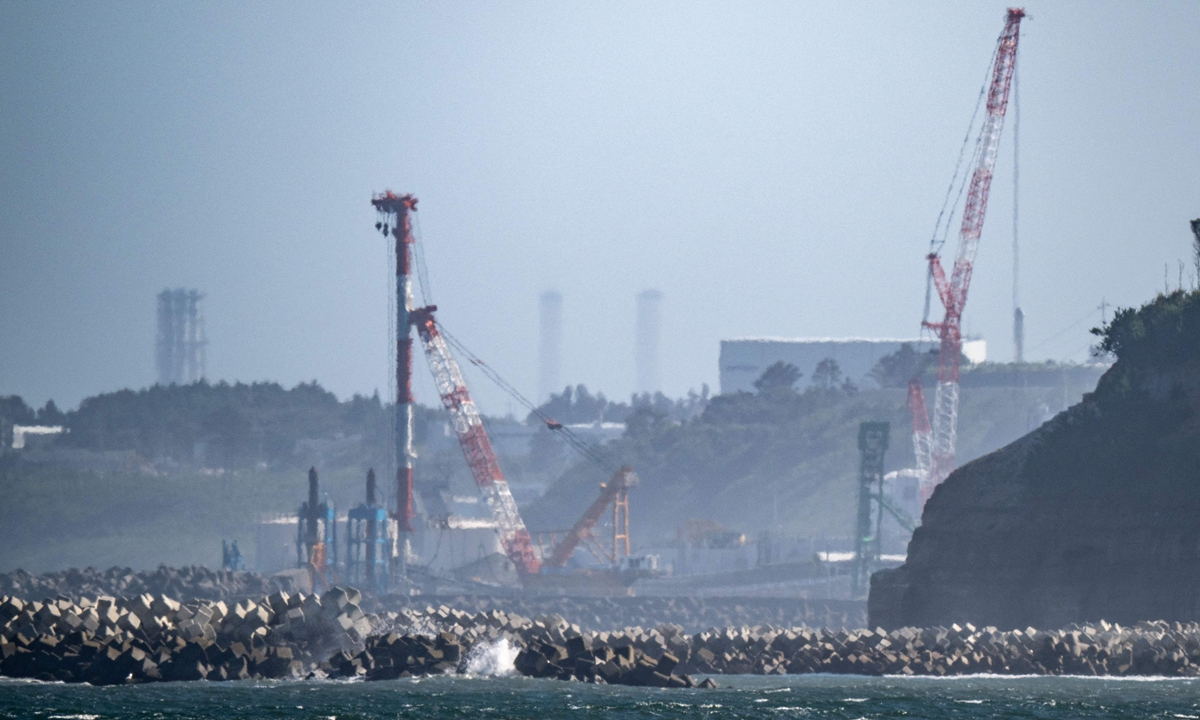
A view shows the facilities of the Tokyo Electric Power Company's crippled Fukushima Daiichi Nuclear Power Plant, as seen from Ukedo fishing port in Namie, Fukushima prefecture on August 24, 2023. Photo: VCG
The accident in Fukushima once again demonstrates the deep-rooted problems of disorder and chaos in the internal management of Japan's Tokyo Electric Power Company (TEPCO). Meanwhile, Japan has the responsibility to promptly and fully disclose information about the incident in a transparent manner and provide responsible explanations, said Chinese Foreign Ministry spokesperson Wang Wenbin on Thursday, after Japanese media reported that 5.5 tons of water containing radioactive materials have leaked from an equipment at Japan's Fukushima Daiichi nuclear power plant.
Japan's plan to discharge Fukushima nuclear-contaminated water into the sea is expected to last for 30 years or even longer. "Can the Japanese government ensure safety and reliability in future emission management? Can the Fukushima nuclear-contaminated water purification system and ocean discharge facilities operate stably and effectively in the long term? We have reasons to be concerned and have doubts about it," Wang said.
TEPCO estimated that the amount of water that leaked was approximately 5.5 tons, which may contain 22 billion becquerels of radioactive materials such as cesium and strontium, according to the Xinhua News Agency, citing local media reports.
The water was assessed to have leaked from a valve left open during cleaning work at the absorption tower, according to a release by the International Atomic Energy Agency (IAEA).
The accident once again highlights the necessity and importance of establishing a long-term effective international monitoring arrangement, Wang said. China urges Japan to respond to the concerns of the international community with a responsible attitude, and dispose of nuclear-contaminated water in a responsible manner.
China also called for Japan to fully cooperate in establishing independent and effective long-term international monitoring arrangements involving the participation of neighboring countries and other stakeholders, and effectively prevent irreversible consequences caused by the discharge, according to Wang.
On the same day, a spokesperson from the Chinese Embassy in Japan also said that the incident exposed the ineffective supervision measures by the Japanese government. This "once again" proves the lack of the long-term reliability of the nuclear-contaminated water treatment system, highlighting the necessity for international supervision, said the spokesperson.
China will closely monitor the subsequent impact of the accident and hope that Japan will promptly disclose relevant information, the spokesperson noted.
Dumping the nuclear-contaminated water is related to the health of all mankind, the global marine environment, and international public interests, the spokesperson noted.
Japan started dumping nuclear-contaminated water from the crippled Fukushima Daiichi nuclear power plant into the Pacific Ocean in August 2023, despite facing opposition and concerns from local fishermen and other countries.
TEPCO has unveiled a plan to release approximately 54,600 tons of nuclear-contaminated water from its facility into the ocean during the fiscal year 2024.
Global Times




